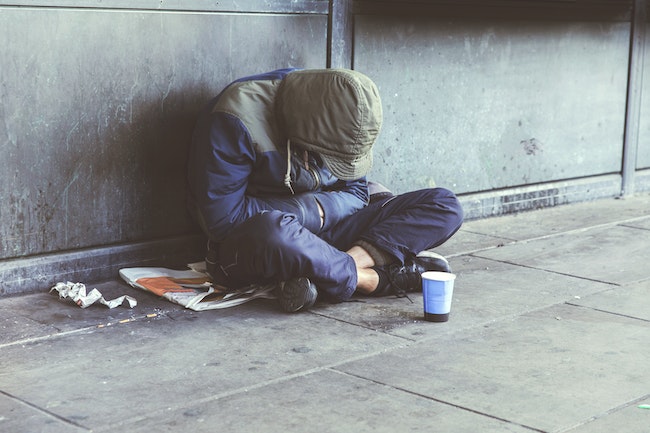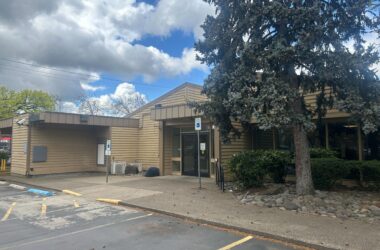COTTAGE GROVE — While the pain points may be easier to identify than the solutions, Cottage Grove City Council this week had a robust discussion on how it might further assist the homeless population in the city.
In a nutshell – and not unique to Cottage Grove – there are three issues to address, as pointed out by councilor Chalice Savage: “Homelessness, affordable housing, the bridge that connects the two.”
It’ll be an ongoing conversation that aims to tackle both long-term and short-term solutions for the unhoused – a daunting task with no one-size-fits-all solution, especially in a state in critical need of housing and mental health services.
“We’re not going to solve the myriad issues that lead to homelessness … Those issues are as complicated as the people themselves, the lives they’ve led, and the circumstances they’ve found themselves in,” councilor Jon Stinnett said. “I keep trying to distill this down to something that we can handle as a public government entity. If you want to get real simple, how do you solve homelessness? Well, with homes right?”
While the numbers are hard to track, the adult headcount in Cottage Grove is estimated at up to 40 people, according to the last study by the Point-in-Time Homeless Count in January 2020. Further, there are an estimated 200 unaccompanied youth, according to McKinney-Vento homeless youth liaisons. That’s a homeless population in a city where the rental vacancy rate is almost at 0%.
There are already a few options for the unhoused to address varying degrees of hardships, but even with the sum of all its parts, alternatives must be sought to better serve the population, city manager Richard Meyers said.
He noted that the responsibility of addressing the homeless crisis has transferred from the laps of federal and state governments down to the laps of local municipalities, putting cities in a tight bind and in a scramble for solutions.
The City must adjust its ordinances to adhere to the state and federal guidelines that state that the prohibition of camping on public property is a violation of the Constitution. The City has to have some place for the unhoused to go, he said.
The City spends $737 a week to clean up abandoned campsites and facilities in the community, not including the big jobs like cleaning up under the bridges or vacated “zombie” houses. Additionally, police services from February 2021 to this month have totaled about $2,600, Meyers said.
Cottage Grove offers various options. There is a place to stay once temperatures dip below 32 degrees. The Warming Shelter at 224 N. 12th St. opened its doors nine times, provided 56 beds, and served 28 community members during its last season. Additionally, the mobile shower serviced 52 people in January, Meyers said.
For those who are unhoused but have cash flow from a job or from social security, there is an affordable tiny home co-op through the Cottage Village Coalition on E. Madison Ave., which range between $300-$600 for rent.
The Cottage Grove Community Center is also an option for the unhoused. Meyers said that while there have been success stories of people getting jobs and breaking down barriers, the center is operated from only 9 a.m. to 5 p.m. and cannot provide “wraparound services” like counseling and full-time security.
Tending to that facility has been consuming city staff. Two staff members have made it their sole focus, in addition to assistance from library staff and volunteers. “We aren’t set up for this work. That’s not in our wheelhouse,” Meyers said.
What the City is set up for, however, is providing infrastructure for those facilities to operate.
The main objective is to take back the community center and redirect the homeless there to a better facility, one that has the opportunity for counseling, is open 24-hours with more space and designated staff, Meyers said. This could be done in partnership with the county, hospitals and other local entities.
Council considered a proposal by Carry It Forward that would staff the facility for up to 40 people for $17,000 a year, and provide those much-need wraparound services. The City would need to build or acquire the infrastructure to do so.
“We’re trying to solve all the facets … if we just do a shelter we’re not doing anything other than putting people inside something. We’re not doing anything to improve it. We’ve got to … get people moving in the right direction to get them out into permanent housing,” Meyers said.
Councilor Candace Solesbee said she is concerned that, if the city were to build a facility, it may attract those who make homelessness a “lifestyle” choice, and would not service those who need a temporary leg up.
Councilor Greg Ervin had similar concerns. “My biggest issue with the city taking on this responsibility is that it improperly sets up the incentive structure and for making change,” he said. “There’s there’s an element that, when when an organization that’s supported almost indirectly by people providing the resource … I’ve noticed that entitlement grows … from the recipients of the of the resource.” Ervin said.
“I don’t feel bad about people feeling ‘entitled’ to shelter at their lowest points. The society we live in this seems to me to be built on rampant, disgusting inequality,” Stinnett said. Ervin later recanted the use of the word “entitlement,” and said that the word was too strong.
Meyers said on Tuesday that there was a gentleman standing outside of his office window. “He’s on social security but not enough to find a home, so he’s living in a tent. Everybody assumes that (the homeless) are people who have made their choice, that this is what they’re doing because they want to. I don’t know many people that want to live outside in a tent in Oregon during the winter or in the rain.”
Council considered hosting a town hall to gauge community opinion at the Armory, suggesting that the event be held after March 31, once mask mandates are lifted.
“There aren’t any solutions that are going to happen tomorrow,” councilor Mike Fleck said. “We have to take these steps because in the long run, it will improve their lives and by default because their lives are better, so is the rest of our communities’ lives. We’re shooting ourselves in the foot if we don’t do something to help out all of our citizens.”
***
HOMELESS RESOURCES
Carry It Forward: 541-654-0139; P.O. Box 50121, Eugene, OR 97405
Services: Community Outreach Programs and Support for the Unhoused. Email: [email protected]
Catholic Community Services Rent Assistance: 541-345-3628
Services: Emergency Rental and Deposit Assistance is provided to those who are eligible, as funding is available. https://www.ccslc.org/rentassistance
Community Alliance of Tenants: 503-288-0130
Services: Renters’ rights hotline.
Community Sharing: 541-942-2176; 1440 Birch Avenue, Cottage Grove, OR 97424
Services: Housing assistance. Hours: Monday, 1:30 p.m.-6:00 p.m. and Tuesday-Friday, 11:00 a.m.-3:30 p.m. www.communitysharing.org
Community Sharing Warming Center: 541-942-2176; 1200 E. Main Street, Cottage Grove, OR 97424
Services: Warming Center is activated when overnight temperature falls to 29 degrees Fahrenheit or below for six hours or more. Pets are welcome within the pet policy. www.communitysharing.org
Cottage Village Coalition (CVC): 541-525-0501 ; 1402 E. Madison Avenue, Cottage Grove, OR 97424
Services: The first permanently affordable tiny home co-op in Cottage Grove. 14 units on 1.1 acres. Status: 9 units occupied; 4 units under construction; $350-450/month. Target Population: 30-60% area median income. www.squareonevillages.org/cvc
DevNW (Formerly Nedco): 541-345-7106 ; 212 Main Street, Springfield, OR 97477
Services: Nonprofit offering a variety of services to help you on the road to financial wellbeing, including one-on-one financial counseling, educational tools, access to funds, affordable housing options, and more. www.devnw.org
Eugene Mission: 541-344-3251; 1542 W. 1st Avenue, Eugene, OR 97440
Services: Shelter including other services: food, clothing, toiletries, and showers. www.eugenemission.org
Home Share Oregon: 503-862-3296
Services: Home Share Oregon is a nonprofit program of the 501c3 organization Oregon Harbor of Hope. Their mission is to prevent housing instability, foreclosure, and homelessness through home sharing. Oregon is in an affordable housing crisis that threatens a stable future for many of us. Home Share Oregon connects homeowners with renters and roommates. www.homeshareoregon.org
Lane County Family Shelter Referral:
Services: Families looking for emergency shelter. An online referral form is now available for SquareOne Villages’ two family Pallet Shelters microsites that will provide a stay in a pallet shelter, and for access to the First Place Family Center Night Shelter Annex.
Looking Glass, Rural: 541-767-3823 ; Crisis Line: (888) 689-3111; 508 E. Whiteaker Avenue, Cottage Grove, OR 97424
Services: Station 7, assists youth, ages 11-21, who are experiencing homelessness, at risk for homelessness, and/or who have run away. www.lookingglass.us/ruralprogram
Habitat for Humanity of Central Lane: 541-741-1707; 1210 Oak Patch Road, Eugene, OR 97402
Services: Supports local needs for housing and restoration of homes for people in need. www.habitatlane.org
Homes for Good: 541-682-3755; 100 W. 13th Avenue, Eugene, Oregon 97401
Services: Section 8, family self-sufficiency, resident services. Agency owned housing, energy services, and maintenance. www.homesforgood.org
Lane County COVID Rent Assistance: 541-682-3776
Services: Lane County Human Services Division has received State of Oregon Supporting Tenants Accessing Rental Relief (STARR) funding in the amount of $4,071,554. Applications for the new funding will be open on Friday, March 19, from 7:00 a.m. to 1:00 p.m. PST. This application is for Lane County residents with household income at or below 80% Area Median Income.
www.LaneCounty.org/RENT
https://www.lanecounty.org/cms/one.aspx?pageId=16741613
Oregon Fair Housing Council: 800-424-3247
Services: Enforces fair housing laws related to discrimination. www.fhco.org
Square One Villages: 541-525-0501; 15 Polk Street, Eugene, OR 97402
Services: Nonprofit organization dedicated to creating tiny home communities for people in need of housing. www.squareonevillages.org
St. Vincent de Paul, First Place Family Center: 541-342-7728; 1995 Amazon Parkway, Eugene, OR 97405
Services: Helping families who are homeless or at risk. Overnight shelter for families with children all year. Families from Cottage Grove or Creswell are welcome. Call to register. www.svdp.us
St. Vincent de Paul Society of Lane County:
Services: Nonprofit human services organization in Lane County. They provide affordable housing, home repair and loans, homeless services, emergency services, employment solutions, retail thrift stores, vehicle donations, recycling, and manufacturing. www.svdp.us
St. Vincent de Paul Society Rural Housing Rehabilitation Loan Program (RHRP): 541-743-7128
Services: St. Vincent de Paul, Society of Lane County program. If you own or are buying your home and land, you may qualify for a low interest, deferred (no-monthly-payment) loan to help with qualifying home repairs. www.svdp.us







